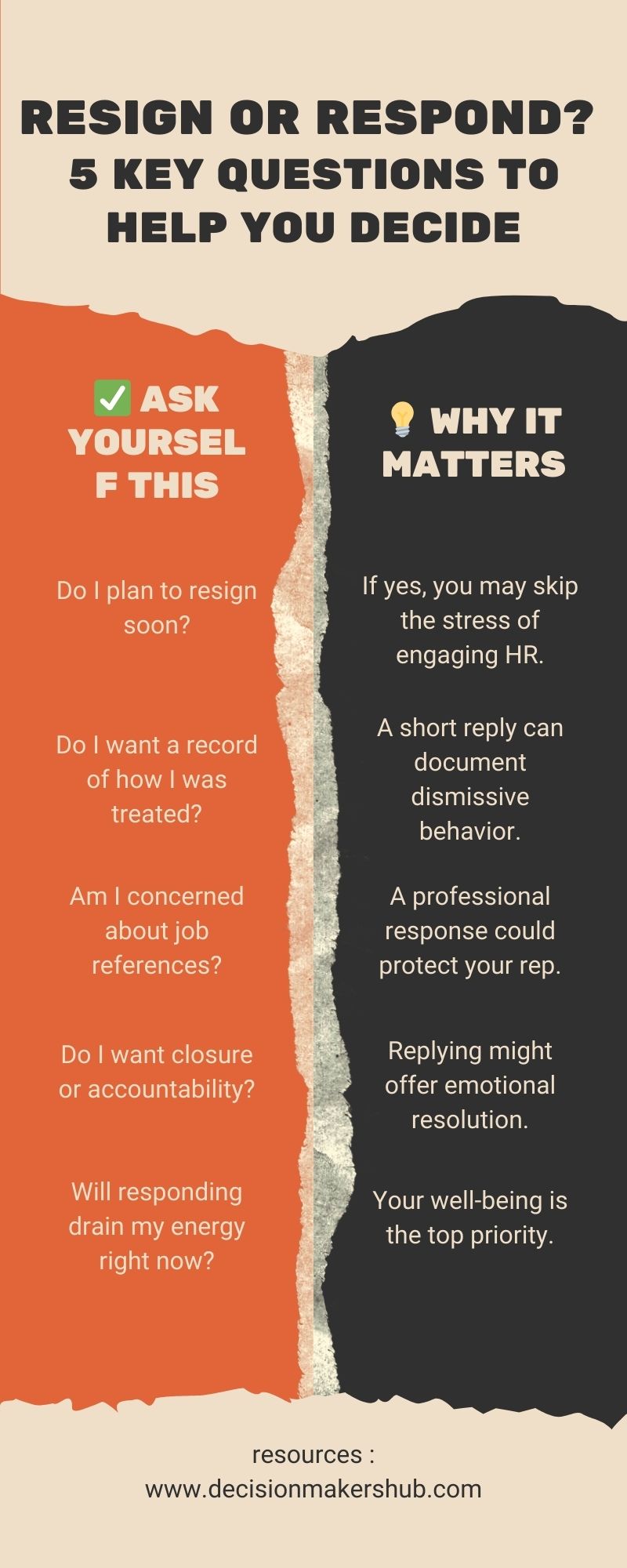Dealing with a health condition that affects your work performance is tough, especially when you’re already considering resignation. If you’ve shared your medical challenges with your employer, received a dismissive response, and then got an HR email about your rights, you might be unsure whether to respond or focus on leaving. This comprehensive guide, offers clear, actionable advice to help you decide. We’ll cover how to handle HR communications, protect your professional reputation, and prioritize your well-being, ensuring the content remains evergreen and relevant.
The Challenge: Balancing Health, Work, and Resignation
Chronic health conditions can disrupt your ability to perform at work. For example, non-diabetic hypoglycemia, as described by the Mayo Clinic, causes symptoms like brain fog, fatigue, and slow cognitive processing when blood sugar drops below 70 mg/dL. These effects can delay tasks requiring sustained focus or quick problem-solving, leading to performance concerns.
When you proactively disclose such a condition to explain recent struggles, you hope for understanding. Instead, you might face comments like your health is “irrelevant” to your job, that you need to “figure it out,” or that you should question your “fit” for the role. These responses can sting, particularly if you’re already unhappy in the job and leaning toward resignation. The situation becomes more complex when HR follows up with an email outlining your rights under the Americans with Disabilities Act (ADA), prompting you to decide whether to engage or move forward with your exit.
Key Factors to Consider Before Responding to HR
Before deciding whether to reply to HR’s email or resign quietly, evaluate these factors to align your decision with your goals:
1. Your Resignation Plans
If you’re certain about leaving due to job dissatisfaction or health-related challenges, responding to HR might seem unnecessary. However, addressing their email could clarify your situation and protect your reputation for future job references.
2. The Importance of Documentation
A written record of dismissive or inappropriate comments from management can prevent misunderstandings. A concise response to HR ensures your side of the story is documented without committing to a lengthy process.
3. ADA Protections
The ADA mandates reasonable accommodations for employees with qualifying disabilities, such as adjusted schedules or breaks for medical needs. However, pursuing accommodations requires medical documentation, which may not align with your resignation timeline.
4. Emotional and Career Considerations
Dismissive responses can be demoralizing, especially when you’re managing a new health condition. Responding to HR might offer closure or accountability, but staying silent could minimize stress if you’re ready to leave.
Should You Respond to HR’s Email?
Deciding whether to reply depends on your priorities. Here’s a detailed comparison of both options:
|
Option |
Advantages |
Disadvantages |
|---|---|---|
|
Respond to HR |
– Documents management’s dismissive comments |
– Could delay your resignation |
|
Stay Silent and Resign |
– Simplifies your exit process |
– No record of management’s response |
When to Respond
Responding makes sense if:
-
You want HR to know about management’s dismissive attitude for the record.
-
You’re concerned about how performance issues might affect future job references.
-
You seek closure or want to advocate for better workplace treatment of health conditions.
When to Stay Silent
Choose silence if:
-
You’re committed to resigning and want a quick, low-stress exit.
-
Engaging with HR feels draining or unnecessary.
-
You trust that your work history won’t impact future opportunities.
Infographic: Resign or Respond? 5 Key Questions to Help You Decide

Crafting a Professional Response to HR
If you decide to respond, your email should be brief, professional, and factual to avoid escalation. Here’s a sample:
Subject: Acknowledgment of ADA Rights Communication
Dear [HR Representative],
Thank you for your email regarding my rights under the Americans with Disabilities Act (ADA). I appreciate the information.
During the performance meeting on [date], I disclosed my health condition to provide context for recent challenges. I was told my health was “irrelevant” to my job performance, that I needed to “figure it out,” and to consider whether I was a “fit” for the role. I am currently assessing my next steps and will follow up as appropriate.
Thank you for your attention.
Sincerely,
[Your Name]
This email:
- Acknowledges HR’s message, reinforcing your awareness of ADA rights.
- Factually notes the dismissive comments, creating a record.
- Maintains a neutral tone to minimize conflict.
Understanding Your ADA Rights
The ADA protects employees with disabilities from discrimination and requires employers to provide reasonable accommodations, provided you can perform essential job functions. According to the U.S. Equal Employment Opportunity Commission (EEOC), accommodations for conditions like hypoglycemia might include:
- Scheduled breaks to manage blood sugar.
- Flexible work hours to accommodate medical needs.
- Permission to use medical devices, like a continuous glucose monitor (CGM), at work.
Requesting accommodations involves submitting medical documentation, which can be time-consuming. If resignation is imminent, you might skip this step unless you intend to stay.
Workplace Accommodation Statistics
- A 2020 EEOC report states that 56% of accommodation requests are granted without issue.
- The Job Accommodation Network (JAN) reports that 60% of accommodations have no cost to employers, with others averaging $500 or less.
Preparing for a Smooth Resignation
If you choose to resign, follow these steps to exit professionally:
- Write a Resignation Letter: Keep it simple, stating your intent to resign and your last day (typically two weeks). Avoid mentioning the health-related conflict unless it serves your purpose.
- Document Interactions: Save emails, performance reviews, and notes about your health disclosure or management’s response for your records.
- Secure References: Identify supportive colleagues or supervisors who can provide positive references, bypassing those involved in the conflict.
- Prioritize Health: Use the transition to focus on managing your condition, such as consulting a dietitian or mastering your CGM.
Additional Tips for Managing Health and Work Transitions
- Seek Support: Consult a healthcare provider or support group to stabilize your condition during the transition.
- Explore Flexible Roles: Look for jobs with remote or flexible options to better accommodate your health needs.
- Know Your Worth: A dismissive workplace doesn’t define your value. Focus on opportunities that align with your health and career goals.
Key Takeaways
- Disclosing a health condition at work can lead to dismissive responses, but HR may follow up with ADA rights information.
- Responding to HR can document inappropriate comments and protect your reputation, while staying silent simplifies your exit.
- A concise, professional email to HR can create a record without escalating tensions.
- The ADA ensures accommodations for qualifying disabilities, but pursuing them may not suit resignation plans.
- Prioritize your health and career aspirations when deciding your next steps.
FAQs
Q: Should I respond to HR about ADA rights if I’m resigning?
A: Respond if you want to document dismissive comments or clarify your situation for future references. Stay silent for a quick, stress-free exit.
Q: How can I respond to HR without causing conflict?
A: Write a brief, neutral email acknowledging their message, factually noting any inappropriate comments, and stating you’re evaluating next steps.
Q: What are my ADA rights for a health condition at work?
A: The ADA entitles you to reasonable accommodations, like breaks or schedule adjustments, if you have a qualifying disability and can perform essential job duties.
Q: Can I resign without addressing the health issue with HR?
A: Yes, you can resign without further engagement, especially if you want a clean break and aren’t worried about references.
Q: How do I protect my reputation when resigning?
A: Document interactions, secure positive references from supportive colleagues, and respond professionally to HR if addressing dismissive comments.
By carefully considering your options and focusing on your health, you can navigate this situation with confidence and move toward a more sustainable career path.
